Top 9 Help Scout alternatives for 2026 (features & pricing)

Kenneth Pangan
Last edited January 16, 2026
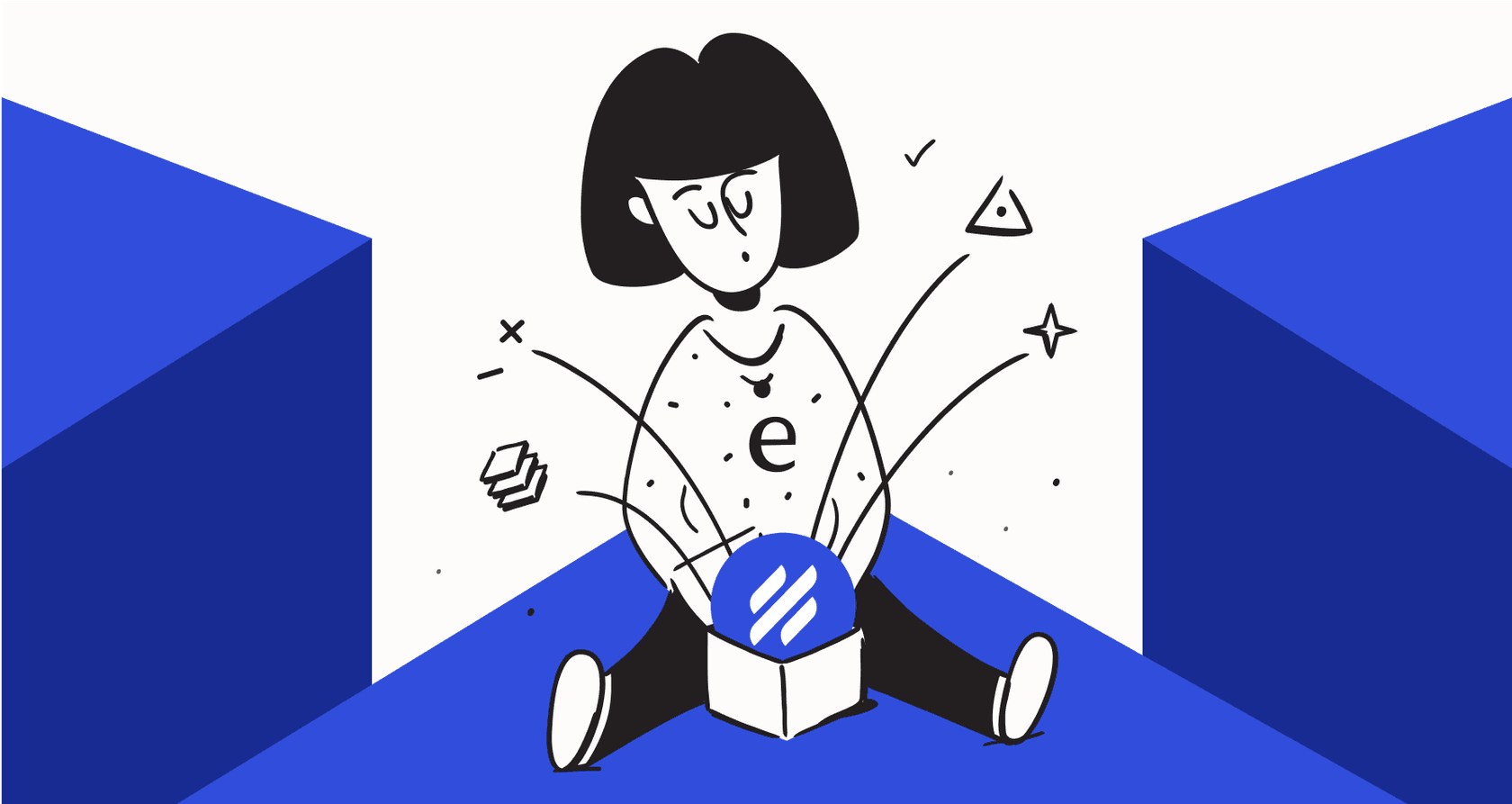
Lots of teams love Help Scout. It’s simple, clean, and built to help you deliver a personal, human touch with your customer support. It’s one of those tools that just feels good to use.
But as your team gets bigger and your customers expect more, you might start feeling the growing pains. Maybe you’re wishing for smarter AI features, deeper reporting, or you’re just worried about whether it can keep up with your company’s growth.
If any of that rings a bell, you’ve come to the right place. We've gone through the best Help Scout alternatives for teams who need more automation, different features, or just a better price.
And here's a thought: "switching" doesn't always mean you have to rip everything out and start over. Sometimes, the smartest move is to just make what you already have even better.
What is help desk software?
First, let's make sure we're on the same page. Help desk software is the command center for all your customer conversations. It’s the one place your team can go to manage tickets, organize messages from email, chat, and social media, and just generally work together without tripping over each other. At its core, you’ll find a shared inbox, a ticketing system to track customer issues, a knowledge base so customers can help themselves, and reporting tools to see how well you’re doing.
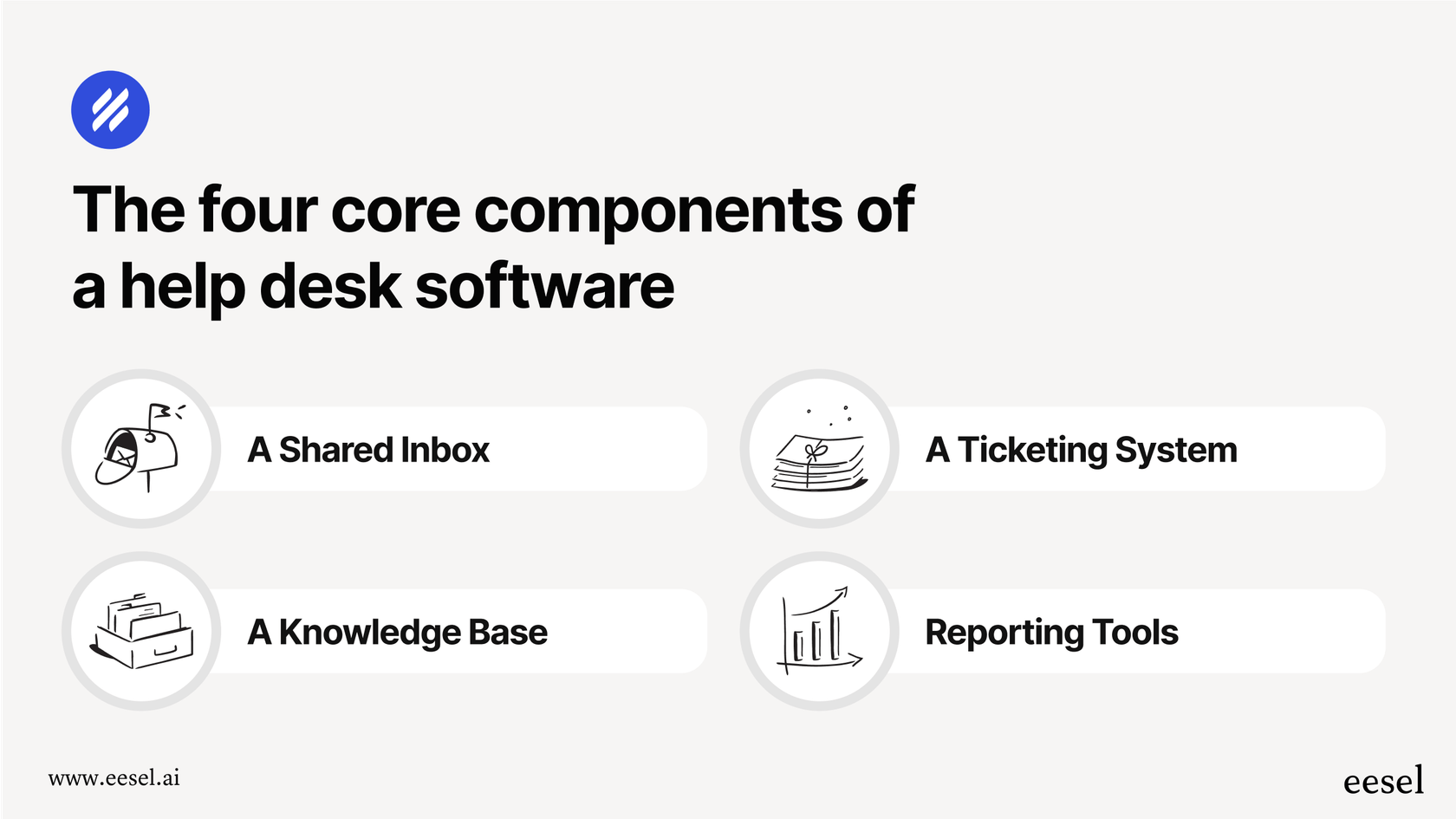
Our criteria for choosing the best Help Scout alternatives
We didn't just pull these names out of a hat. To build a list you can actually use, we measured every tool against a few key things:
- The basics have to be solid. Every tool here is great at the fundamentals: Managing tickets, letting your team collaborate easily, and pulling in conversations from different channels. No exceptions.
- Real AI and automation. We looked past the marketing buzzwords to see what the AI could actually do. Can it handle real customer questions and help your agents, or is it just a glorified chatbot? We also checked if the good stuff was included or hidden behind expensive add-ons.
- Pricing that makes sense. Can the tool grow with you? We leaned toward platforms with clear pricing. Usage-based models are great, but strict per-seat plans can feel like you're being punished for expanding your team.
- Plays well with others. Your help desk can't be an island. It has to connect smoothly with the other tools you rely on, whether that’s Slack, Jira, or your CRM.
Comparison of the best Help Scout alternatives
If you're short on time, here’s a quick rundown of our top picks for Help Scout alternatives.
| Platform | Best for | Starting price | Standout feature |
|---|---|---|---|
| eesel AI | Upgrading your existing help desk with powerful AI | $239/month (annual) | Adds AI Agent & Copilot without migration |
| Zendesk | Enterprise teams needing a powerful, all-in-one suite | $19/agent/month | Advanced customization and scalability |
| Freshdesk | Budget-conscious teams and startups | Free plan available | Generous free tier with core features |
| Front | Teams wanting a collaborative, email-centric inbox | $19/user/month | Seamless team collaboration in a shared inbox |
| Zoho Desk | Businesses already using the Zoho ecosystem | Free plan available | Tight integration with Zoho CRM and other apps |
| LiveAgent | Multilingual support and built-in call center features | $9/agent/month | Extensive language support out-of-the-box |
| Gorgias | Ecommerce stores, especially on Shopify | $10/month (volume-based) | Deep integration with ecommerce platforms |
| Hiver | Teams who want to manage support from Gmail | $15/user/month | Works directly inside the Google Workspace |
| Tidio | Small businesses focused on live chat and chatbots | Free plan available | Powerful and easy-to-use chatbot builder |
The 9 best Help Scout alternatives in 2026
Every tool here has its own strengths, and the best fit for you really depends on what your team needs. Let's get into the nitty-gritty.
1. eesel AI: A unique Help Scout alternative that upgrades, not replaces
What if you could get all the AI power you’re missing without having to leave Help Scout? That's the whole idea behind eesel AI. It's the smart move for anyone dreading a massive migration. Instead of tearing out your help desk, you just add an AI layer on top. With a single click, eesel AI integrates with platforms like Help Scout, Zendesk, and Freshdesk to automate your support. It learns from all your company knowledge, past tickets, help articles, and even your private documents in places like Google Docs or Confluence. This means you get an AI that actually understands your business.
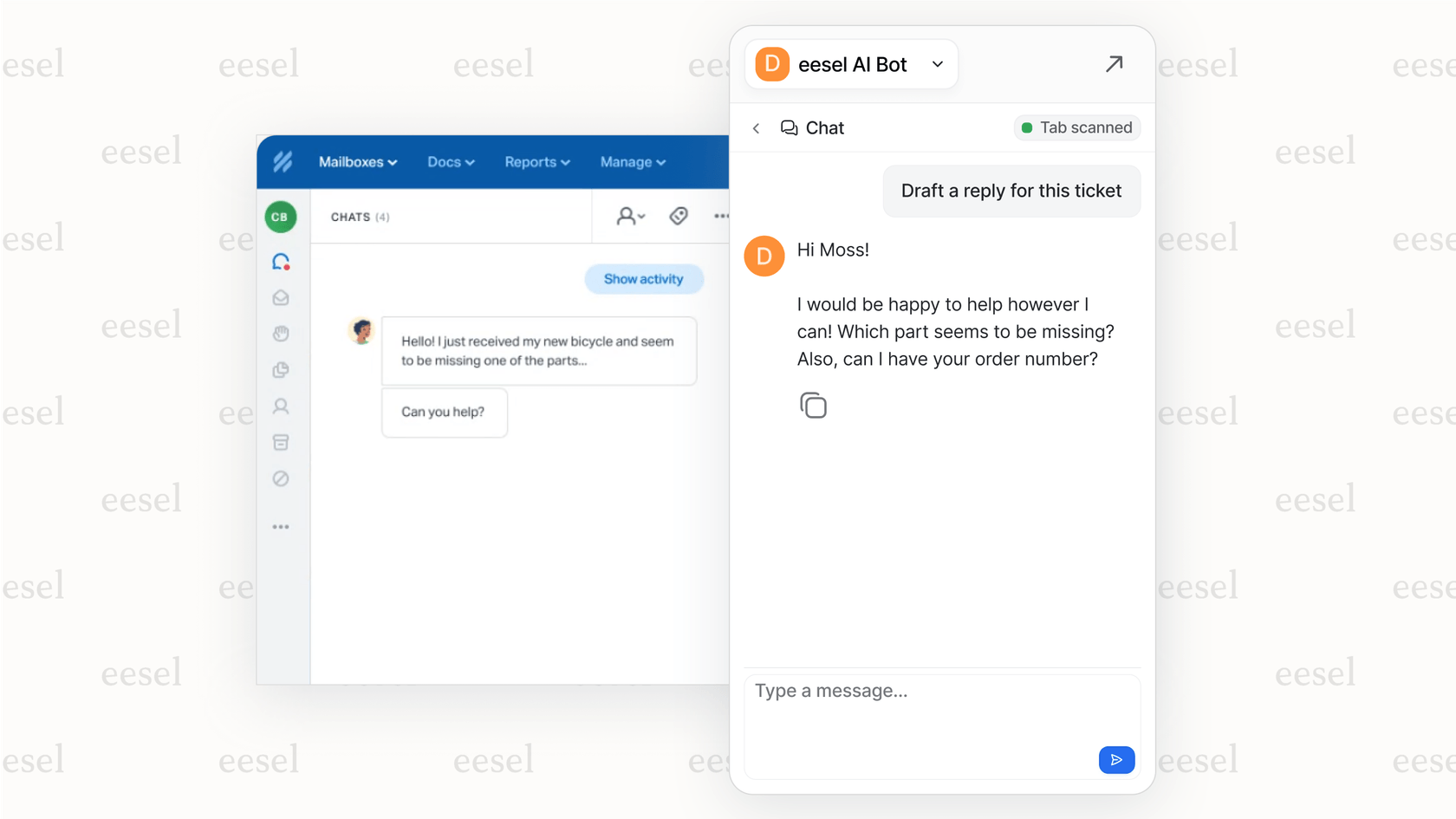
Pros:
- You get to skip the massive headache and cost of migrating to a new help desk.
- It provides a powerful AI Agent for your frontline support and an AI Copilot that helps human agents draft replies and take actions.
- You can run a simulation on your past tickets to see how it will perform before you go live. This lets you check the ROI and find any gaps in your knowledge base.
- The pricing is clear and based on interactions, not seats, so it grows with you fairly.
Cons:
- It isn’t a standalone help desk. You need to have a platform like Help Scout already in place.
- It's built to supercharge your support workflow, not to be your core ticketing system.
Pricing: The Team plan kicks off at $239/month (billed annually) and covers up to 1,000 AI interactions per month.
2. Zendesk: A powerful Help Scout alternative for enterprise teams
Zendesk is the industry standard for customer service, and for good reason. It’s an all-in-one platform that’s incredibly powerful and customizable, which is why it's the gold standard for large and enterprise companies. With a huge marketplace for apps and some seriously deep reporting tools, it can pretty much handle any use case you can imagine. Zendesk's position is further strengthened by its acquisition of Ultimate.ai, bringing world-class multilingual automation directly into its ecosystem.
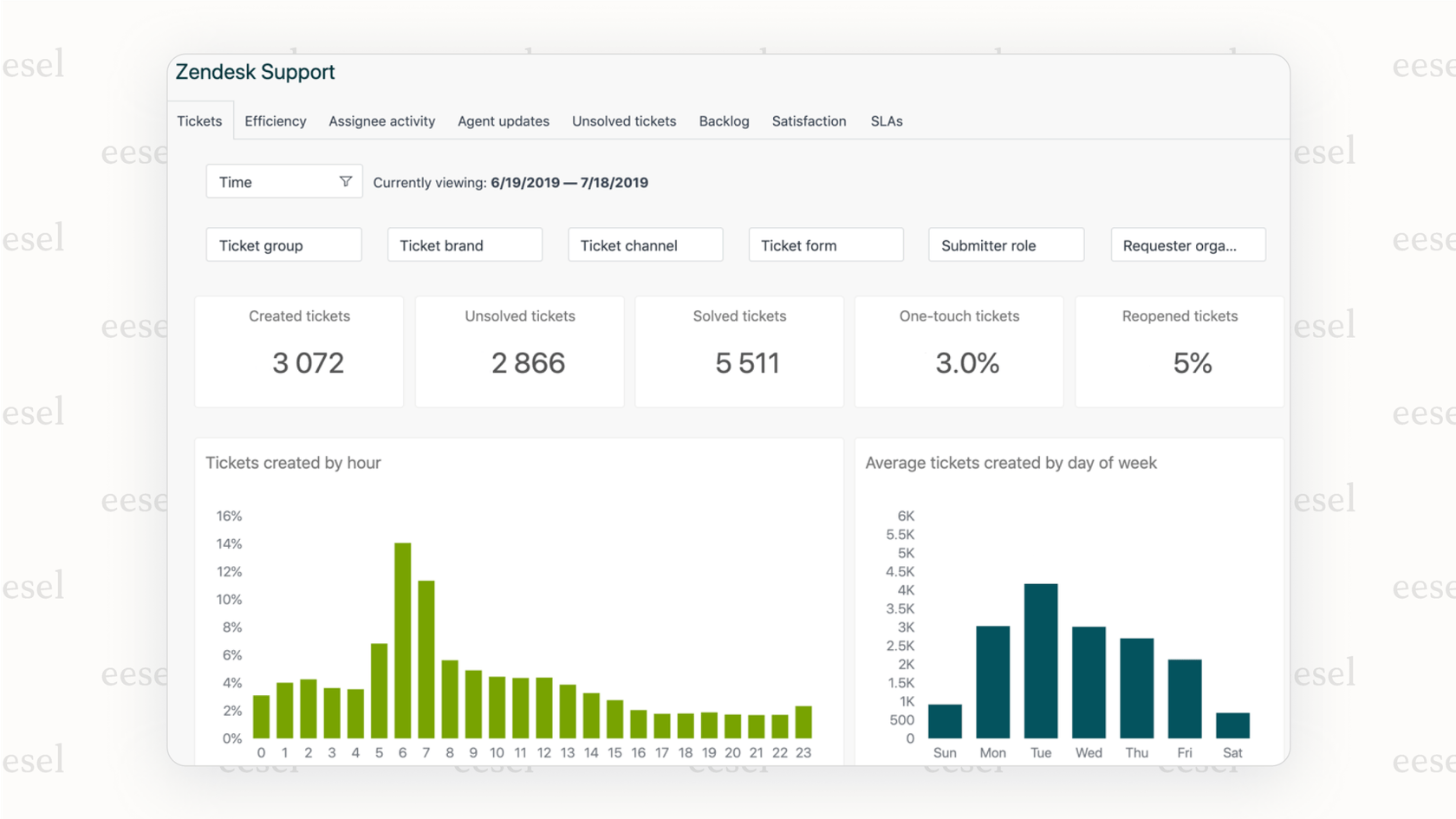
Pros: It can scale to any size, has some of the best reporting on the market, and offers over 1,500 integrations in its marketplace. Its integration with Ultimate.ai provides some of the most robust AI capabilities available today.
Cons: The platform's enterprise-grade power means it provides a vast array of options that might involve a more detailed configuration process to fully leverage its deep capabilities.
Pricing: Plans start at $19/agent/month (billed annually), offering tiered options that align with different team sizes and requirements.
3. Freshdesk: A budget-conscious Help Scout alternative
Freshdesk is a robust and reliable option, particularly for small and medium-sized businesses looking for a mature platform with exceptional value. It offers a massive amount of functionality for the investment, including a free plan that's one of the most generous in the industry.
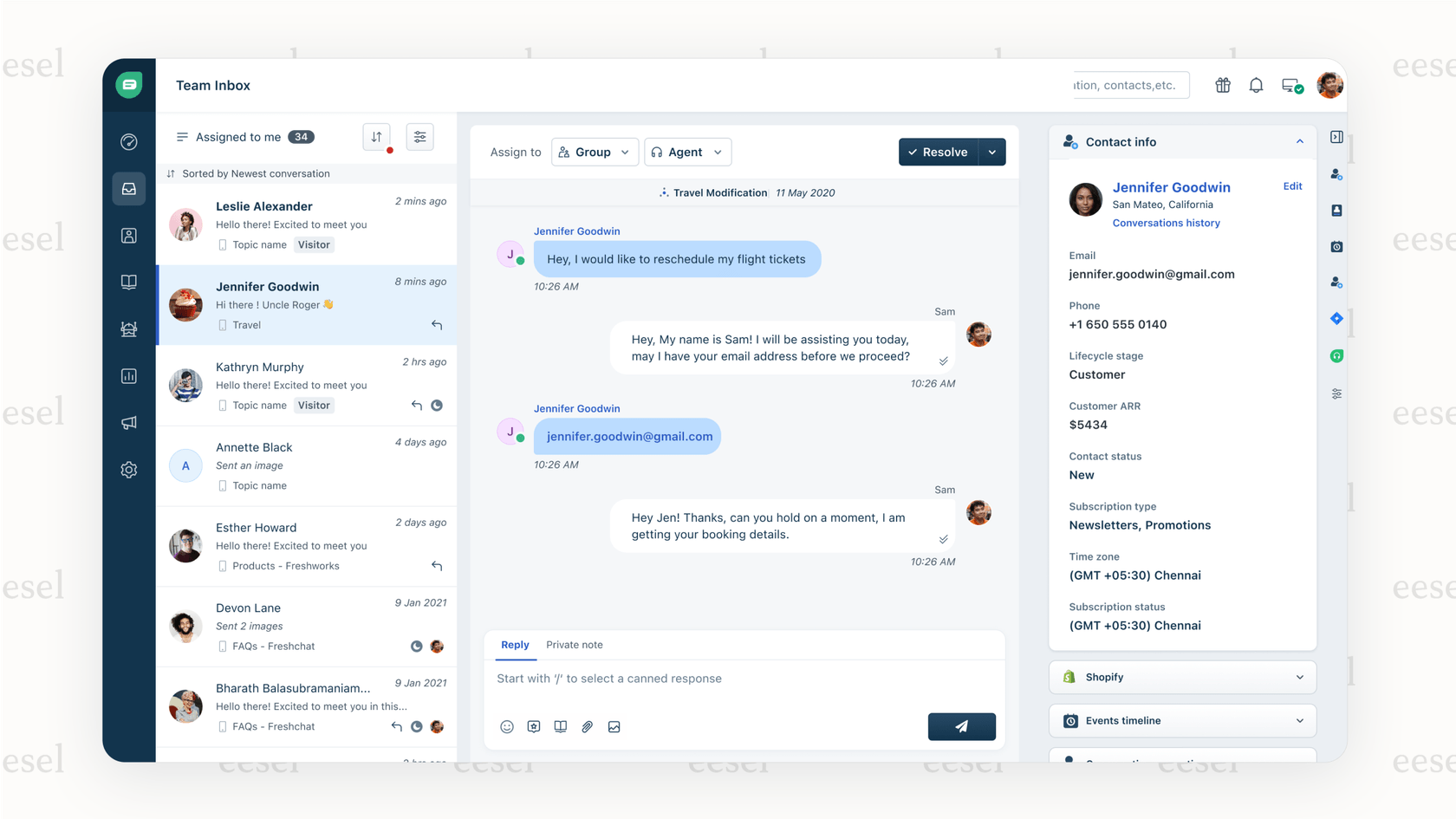
Pros: The free plan for up to 10 agents is a huge advantage for growing teams. It provides solid multichannel support and powerful workflow automations out of the box.
Cons: With such a deep feature set, the interface provides a lot of options that might take a moment to navigate. However, this complexity is what makes it so powerful and scalable for growing teams.
Pricing: A free plan is available. Paid plans start at $15/agent/month (billed annually).
4. Front: A collaborative Help Scout alternative for shared inboxes
Front feels like a shared inbox on steroids. It's built for serious team collaboration, letting different departments like support, sales, and ops manage all their messages from one place that still feels like a personal email client.
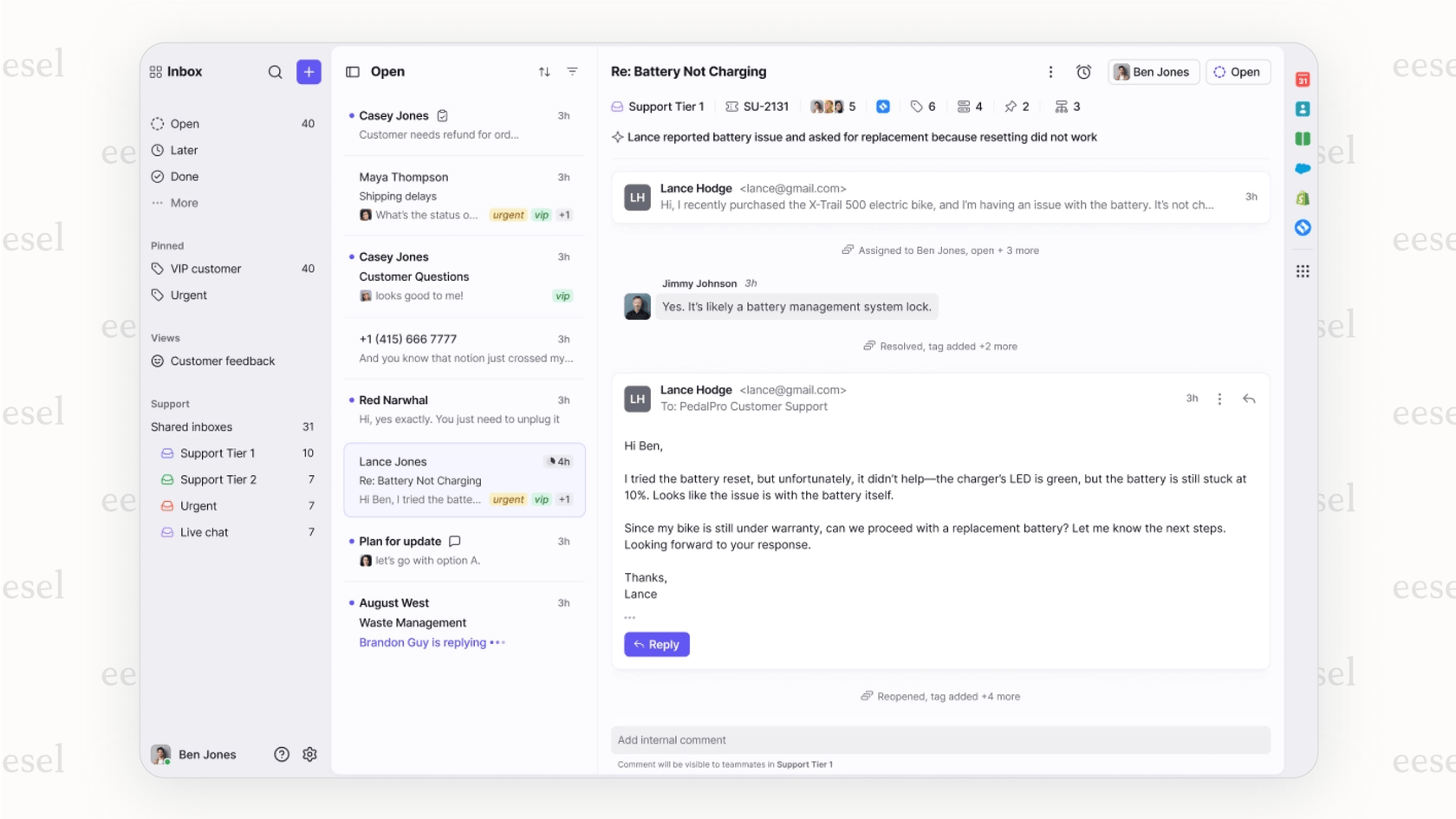
Pros: Being able to reply from personal email addresses feels more natural and helps build a connection with customers. The interface is clean, modern, and just built for teamwork.
Cons: It's missing a few key help desk features, like a built-in knowledge base. The starter plan also has a user limit, which might push you to upgrade sooner than you'd like.
Pricing: Starts at $19/user/month (billed annually).
5. Zoho Desk: The integrated Help Scout alternative for Zoho users
If your company is already running on Zoho's other apps, then using Zoho Desk is a no-brainer. It connects perfectly with Zoho CRM and other tools to give your agents a full picture of every customer they talk to.
Pros: Its free plan is packed with more features than most. It has strong automation tools and offers amazing value for the price.
Cons: The user experience can feel a little clunky and inconsistent as you jump between different Zoho apps. It's at its best when you're fully committed to the Zoho ecosystem.
Pricing: A free plan is available. Paid plans start at $14/user/month (billed annually).
6. LiveAgent: A versatile Help Scout alternative for multilingual support
LiveAgent is a versatile help desk that's a great choice for businesses with customers all over the world. Its biggest claim to fame is its wide-ranging language support and built-in call center features, which many others only offer through clumsy third-party integrations.
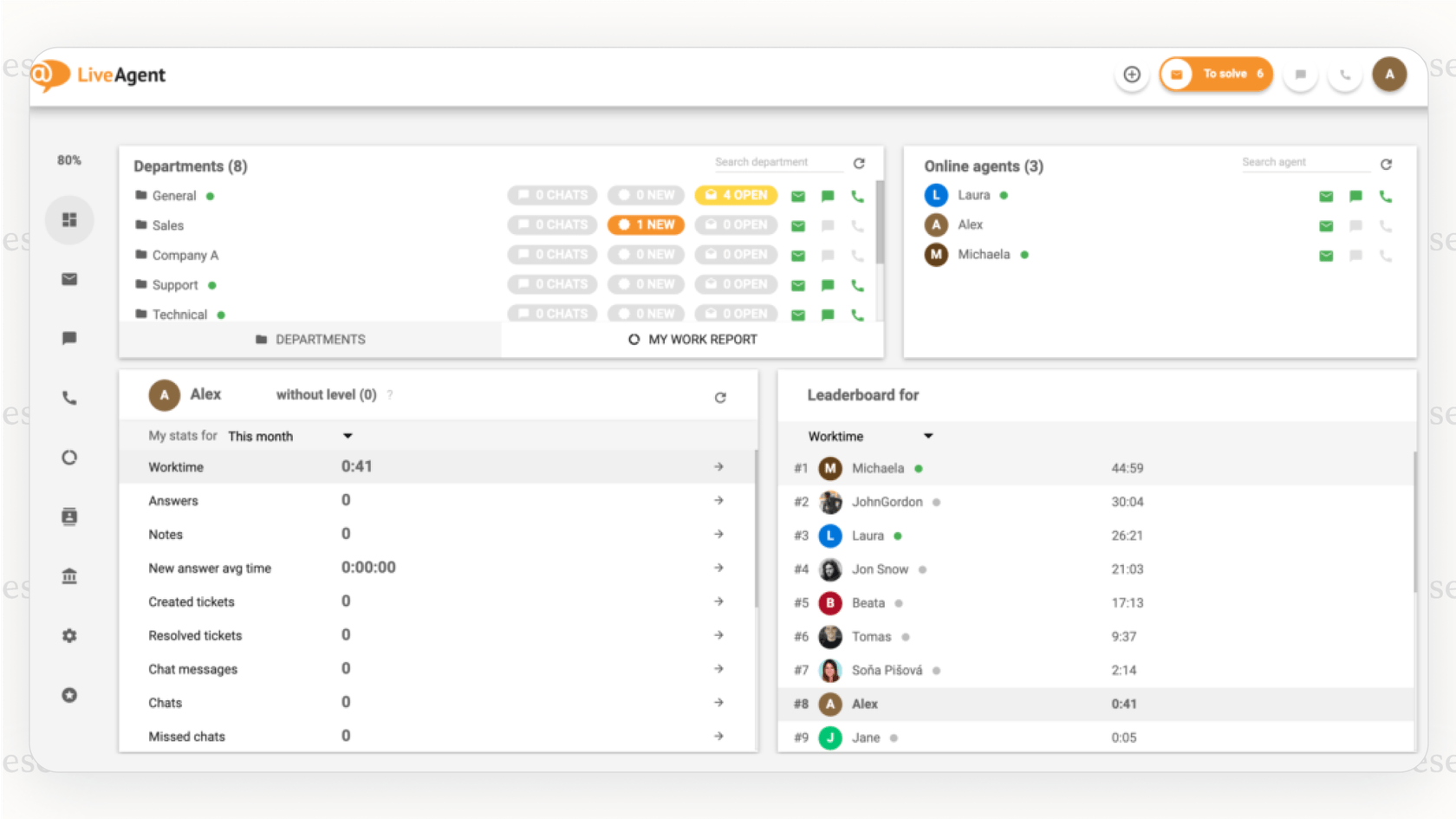
Pros: It supports over 40 languages right out of the box, has a built-in call center for phone support, and features a user-friendly ticket management system.
Cons: Some of the more advanced tools, like automation rules, are only available on the higher-priced plans. Its team collaboration features aren't as strong as some others on this list, either.
Pricing: Starts at a very wallet-friendly $9/agent/month.
7. Gorgias: The ecommerce-focused Help Scout alternative
Gorgias is a help desk built from the ground up for one thing: Ecommerce. It connects deeply with platforms like Shopify, Magento, and BigCommerce, pulling customer and order information right into the agent's workspace.
Pros: The ecommerce integrations are incredible. Agents can do things like issue a refund or check on an order without ever leaving the help desk. It can even help you track how much revenue your support team is generating.
Cons: Gorgias offers tiered plans that allow teams to scale their costs alongside their ticket volume. Its reporting is highly specialized for ecommerce merchants, ensuring that the metrics provided are directly relevant to driving online business growth.
Pricing: Starts at $10/month, providing a low entry point for businesses that want to grow their volume.
8. Hiver: The Gmail-based Help Scout alternative
Hiver has a really interesting take on the help desk: It lives completely inside your Gmail inbox. It's the perfect fit for teams that are all-in on Google Workspace and don't want to add another tool to their daily routine.
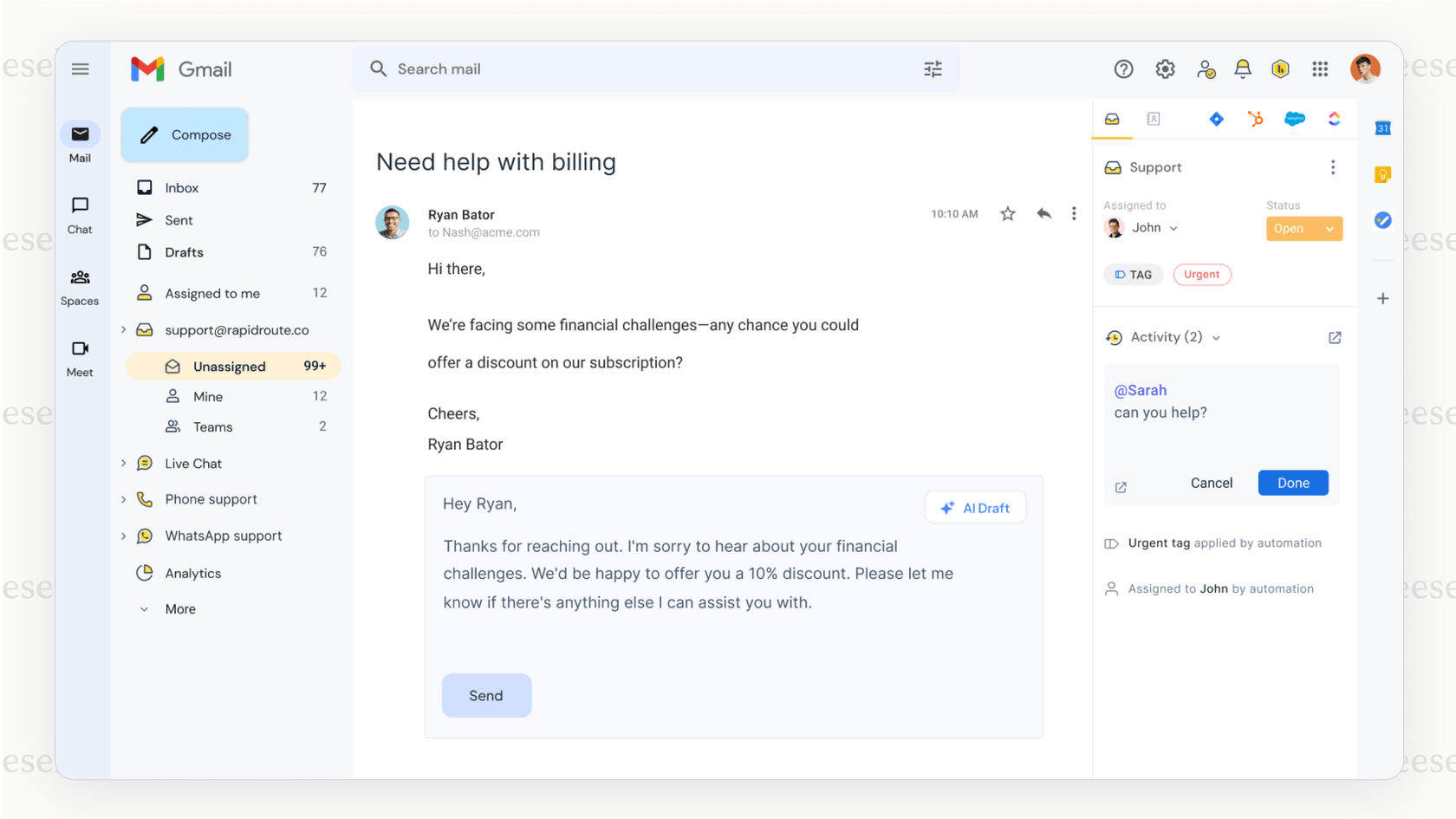
Pros: If you know how to use Gmail, you already know how to use Hiver. It's super easy to set up and great for collaboration without ever having to leave your inbox.
Cons: Its greatest strength is also its biggest weakness. It only works for Google Workspace users and doesn't have the advanced features or reporting of a dedicated help desk.
Pricing: Starts at $15/user/month (billed annually).
9. Tidio: A live chat Help Scout alternative for small business
Tidio is an all-in-one customer service platform that is especially good at live chat and AI chatbots. It's a wonderful choice for small businesses that want to automate customer chats, capture leads, and offer instant help on their website.
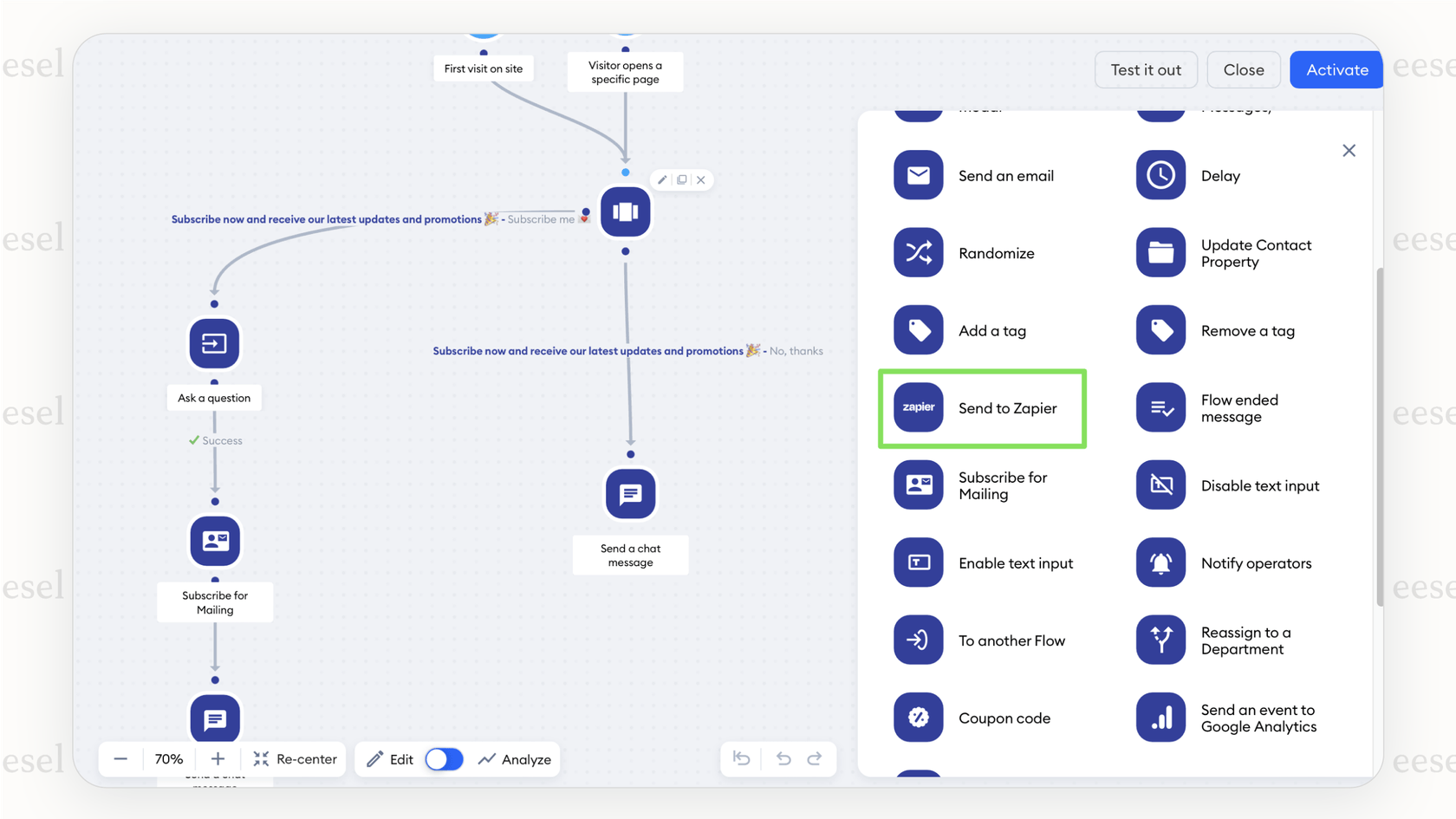
Pros: The chatbot builder is powerful but still surprisingly easy to use, even if you're not technical. It has a generous free plan and brings live chat, email, and social media together in one simple inbox.
Cons: It's really focused on chat automation. If your team deals with a lot of complex email tickets, it might not be as capable as other, more traditional help desks.
Pricing: A free plan is available. Paid plans start at $24.17/month.
How to choose the right Help Scout alternatives for your business
Switching your help desk is a big decision, so take your time. Here’s how to get it right:
- Figure out what's really broken. Why are you actually thinking about leaving Help Scout? Is the whole platform not working for you, or are you just missing a few key features, like better AI? A full migration is a huge project. If you just need to fill a gap, an AI layer like eesel AI can solve your problem in minutes, not months.
- Think about the real cost of switching. Look past the monthly price tag. You have to account for the time it takes to set everything up, move all your old data, and retrain your entire team. A tool that plugs into what you already use is almost always going to be cheaper and faster to get going.
- Look under the hood of the AI. Not all "AI" is the same. Ask hard questions. Is it a simple chatbot, or can it actually understand context and solve complex problems? Does it learn from all your company's knowledge, past tickets, internal wikis, private docs? And most importantly, can you test it on your own data before you buy?
- Pick a tool that can grow with you. Look for a pricing model that scales with your success, not against it. Per-seat pricing penalizes you for growing your team. On the other hand, usage-based models encourage collaboration and scale as your business does.
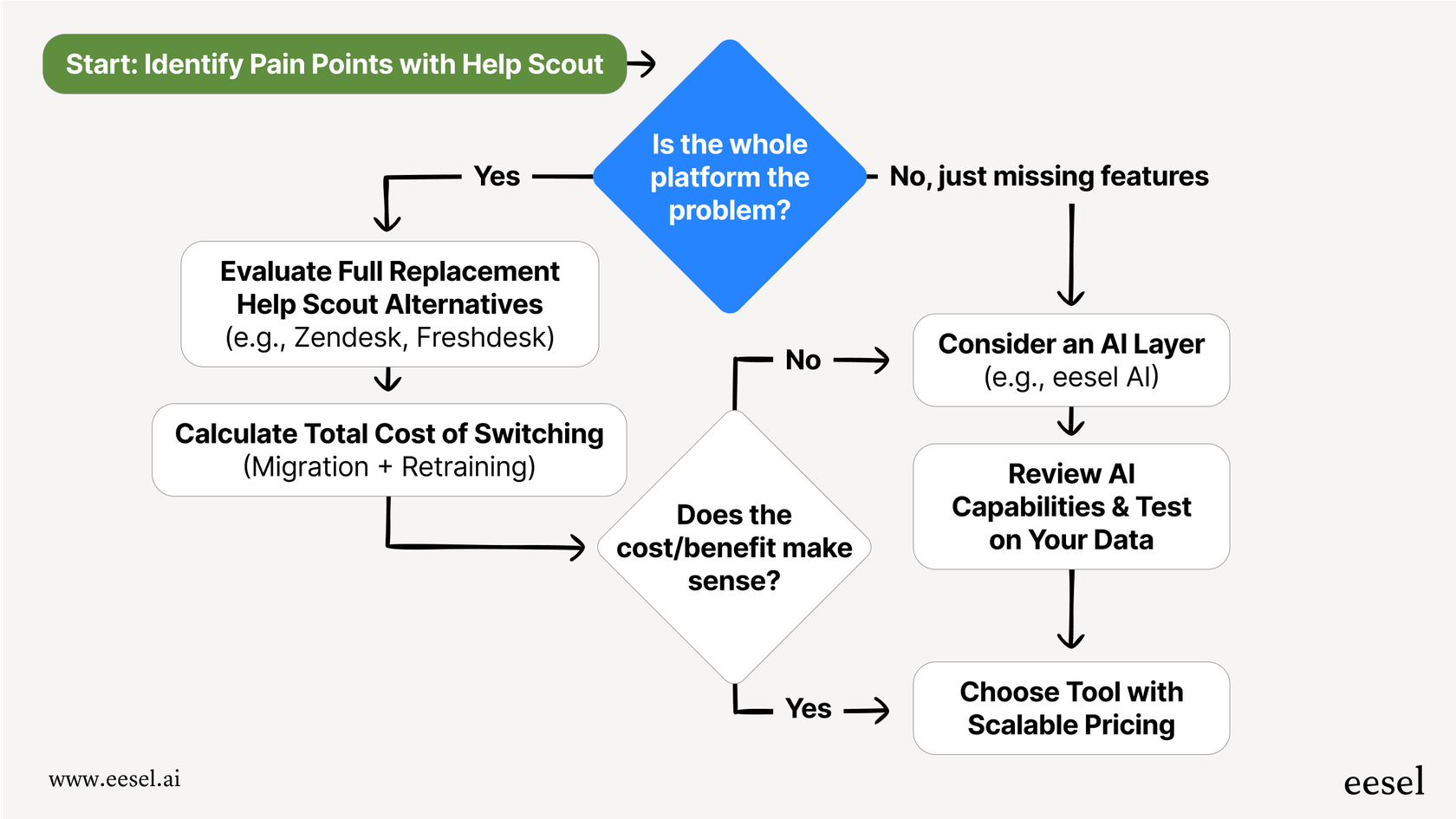
The final word on Help Scout alternatives
Choosing a new tool really boils down to what you're trying to fix. While platforms like Freshdesk and Zendesk can replace Help Scout entirely, that means you're signing up for the effort and risk of a full migration. Freshdesk and Zendesk remain industry leaders for teams that need a mature, enterprise-grade platform that grows seamlessly with their business.
If your main problem is that Help Scout’s AI and automation features are holding you back, the smarter, faster, and cheaper option is to improve the tool you already have. An AI layer like eesel AI gives you the next-generation features you're looking for without the headache. You can keep the help desk your team already knows and loves, and just make it a whole lot better.
Ready to see what that feels like? Book a demo to simulate eesel AI on your historical tickets or start your free trial today
Frequently asked questions
Platforms like Freshdesk, Zoho Desk, and Tidio offer excellent free or low-cost plans that are perfect for startups. They provide all the core help desk features you need to get started without a significant financial investment.
For enterprise-level reporting and customization, Zendesk is a powerful option that can scale with large teams. If you only need to upgrade your automation and AI, an AI layer like eesel AI adds those features to your existing setup without a full platform switch.
Gorgias is the top choice for deep ecommerce integration, allowing agents to manage orders and customer data directly from the help desk. Alternatively, an AI tool like eesel AI can connect to your Shopify data, providing powerful ecommerce support within your current system.
The simplest path is often to enhance what you already have instead of replacing it entirely. Tools like eesel AI plug directly into Help Scout, giving you powerful new features in minutes without the cost and disruption of a full migration.
Hiver is designed for this exact purpose, as it works directly inside Gmail. It allows your team to manage customer conversations from a familiar interface without switching to another app.
The most significant advantage is often more advanced and mature AI and automation. While Help Scout is improving, many alternatives and add-on tools offer more sophisticated AI agents, chatbots, and complex workflow automation out of the box.
Share this post

Article by
Kenneth Pangan
Writer and marketer for over ten years, Kenneth Pangan splits his time between history, politics, and art with plenty of interruptions from his dogs demanding attention.





